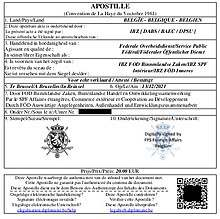Understanding the Apostille Process: A Comprehensive Overview to International File Verification
Navigating the detailed landscape of international document authentication can be discouraging without a clear understanding of the apostille procedure. This guide meticulously details the required steps, from determining which files call for certification to sending them for verification by the Competent Authority. Grasping the importance of an apostille and acknowledging prospective pitfalls, such as incomplete submissions and language barriers, can dramatically improve the authentication trip. What precisely specifies an apostille, and why is it so important for documents destined for Hague Convention nations? These inquiries develop the foundation of our expedition into this crucial legal procedure.
What Is an Apostille?
An apostille is an official accreditation that confirms the authenticity of a paper for usage in another nation. This qualification, released by a marked authority in the nation where the paper originated, makes certain that the document is identified as legitimate and legit in the worldwide sector. The process of getting an apostille includes a number of steps, including the confirmation of the file's trademarks, seals, and stamps by ideal governmental bodies.
The apostille serves as a globally acknowledged kind of authentication, made possible by the Hague Convention of 1961. This treaty, formally recognized as the Hague Convention Eliminating the Requirement of Legalisation for Foreign Public Files, standardizes the procedure of document qualification among participant nations. The apostille itself is a standardized certificate that has particular info, such as the releasing authority, the native land, and the date of issuance.
It is very important to note that not all papers are eligible for an apostille. Generally, public files like birth certifications, marriage licenses, court orders, and instructional diplomas get this qualification. Private papers, such as contracts and agreements, may need registration and additional steps to qualify.
Importance of Apostille
Understanding what an apostille is sets the stage for appreciating its significance in international negotiations. houston tx apostille. An apostille, basically a kind of accreditation released by a marked authority, confirms the authenticity of a file for use in international countries that are notaries to the Hague Apostille Convention. This standard process gets rid of the requirement for more legalization by embassies or consular offices, thereby enhancing global transactions
The relevance of an apostille can not be overstated. It guarantees the integrity and acceptance of crucial documents-- such as copyright, marital relationship licenses, and academic diplomas-- across borders. For services, it facilitates the smooth conduct of international profession, mergings, and procurements by supplying a trusted technique of paper confirmation. This reduces bureaucratic difficulties, saving both time and sources.
Furthermore, an apostille enhances legal safety and security and compliance. Federal governments and organizations can confidently rely on the authenticity of papers bearing an apostille, alleviating the danger of fraud his response and misrepresentation.
Files That Call For Apostille
When engaging in worldwide transactions or lawful matters, specific files often demand the verification given by an apostille. This ensures their acknowledgment and acceptance in nations that are signatures to the Hague Apostille Convention. Commonly, personal papers such as copyright, marital relationship certifications, and fatality certificates need an apostille, particularly when they are made use of for processes like immigration, marriage abroad, or international probate issues.
Educational files are an additional category often needing apostilles. Diplomas, records, and academic records often require this verification for objectives such as pursuing additional education and learning, employment, or professional licensing in an international country (houston tx apostille). This action guarantees that the papers are acknowledged as legitimate and legitimate
Legal documents, consisting of powers of attorney, testimonies, and court orders, additionally commonly necessitate apostilles. Company records such as certifications of unification, bylaws, and commercial contracts might need an apostille to facilitate global profession, develop foreign branches, or participate in cross-border legal proceedings.
Actions to Acquire an Apostille

Getting an apostille includes a multi-step procedure that makes certain the credibility and acceptance of your papers in international nations. The initial step is determining which records need an apostille. houston tx apostille. Common papers include copyright, marriage licenses, academic transcripts, and company papers
As soon as identified, the Homepage file has to be accredited by the appropriate releasing authority. After qualification, the file needs to be submitted to the assigned Competent Authority in the record's nation of beginning.
The entry process typically needs a finished application, the initial file, and a cost. Some territories may provide the option of expedited handling for an additional cost. Upon effective verification, the Competent Authority will fasten the apostille certificate to the record, thereby validating its credibility.
Usual Difficulties and Solutions
Browsing the apostille procedure can provide several typical obstacles that, if not effectively addressed, might postpone or complicate file verification. One frequent problem is the entry of inaccurate or insufficient papers. Each country has specific demands for the types of records that can be apostilled, and any kind of deviation from these can lead to denial. Making Website sure that all papers are accurate and total before entry is important.
Another usual challenge is comprehending the different handling times. Processing times can differ considerably between nations and also between different areas within the exact same country. It is important to make up these variants when planning the apostille procedure to prevent unforeseen hold-ups.
Additionally, language barriers can present substantial obstacles. Records in a foreign language commonly require licensed translations, and any mistakes in translation can bring about further problems. Involving a specialist translation solution can alleviate this threat.

Final Thought
Mastering the apostille process dramatically boosts the effectiveness of international paper authentication. By understanding the necessity of identifying and licensing called for documents, and navigating the entry to the Competent Authority, the procedure ends up being extra manageable. Recognition of usual difficulties, such as insufficient entries and language obstacles, further help in protecting against possible delays. Ensuring files are appropriately apostilled facilitates their acceptance in Hague Convention signatory countries, therefore supporting seamless global legal and administrative procedures.